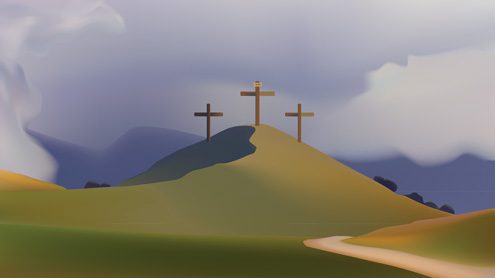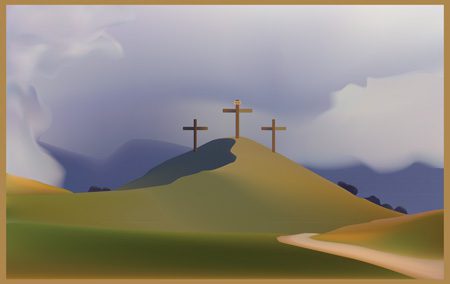By Glen Doss, Major
“I feel I am going insane. I have lost my bearings. I can’t live like this anymore. I would rather be dead! Major, can you show me the way to God?” His voice breaking, the man started to sob.
Wrapping an arm around the kneeling man’s shoulders, I prayed with him, then hugged him tight. It was Easter morning at the Kona Salvation Army corps on the Big Island of Hawaii. This was my first corps appointment following several years on the mainland as an Adult Rehabilitation Center administrator. Moving from seeker to seeker following the altar call, I was reminded of the universality of the message of Salvation: Jesus is alive! Christ is our living Lord! He has the power to resurrect us from “death to life” (John 5:24 NIV).
I am repeatedly moved by the transformational power of the Spirit of Christ to work a dramatic change in the hearts of people everywhere across all times. While the world changes around us, the drama of the miracle remains as marvelous as ever: The old has gone, the new has come (2 Cor. 5:17). Despite the two millennia that have transpired between that first Easter and today, the resurrection power of Christ is as potent as ever. This is so because neither the fundamental nature of humanity nor our Lord himself are any different. Jesus Christ is the same yesterday and today and forever (Heb. 13:8).
Any cursory observation of history reveals that the fundamental nature of the human heart has not changed since the beginning of time. Always when left to its own devices, the inclination of the heart is evil (Gen. 8:21). God’s beautiful but tantalizing world is way too big for us, yet its satisfactions too small. Since God originally made us for eternity, the limited pleasures of our world cannot fully satisfy us. And sadly we people have proved particularly effective at creating havoc in our drive to satisfy ourselves.
It was upon such a world stage—one sinking into dissolution through the weight of its own corruption—that the Son of God appeared 2,000 years ago. Through a marvelous act God became one of his own creations. In a miraculous exchange he switched places with us on the cross, accepting the punishment we deserved so that we might be reconciled with him. Through his resurrection we now have the opportunity for a new, eternal “rich and satisfying life” (John 10:10 NLT).
“Do not be afraid, for I know you are looking for Jesus, who was crucified. He is not here; he is risen.” These words, spoken by a divine messenger to reassure a terrified woman, spread like wildfire: “He has risen from the dead” (Matt. 28:7 NIV).
Long before electronic media would enhance the way we relate to one another, the primary mode of communication of the Christian faith was—and remains—the living witness of Christians themselves. “See how these Christians love one another!” exclaimed the early Christian theologian Tertullian. The passion of these original pioneers of the faith was so intense and their conviction so evident that they were soon “turning the world upside down” (Acts 17:6 NRV).
In 2010 Time Magazine included Christianity as one of the 100 “ideas” that changed the world. “There is no doubt that Jesus Christ is one of the most significant individuals in history,” the article reads. “Today, more than 20 centuries after Christ’s death, Christianity remains one of the most potent forces in the world… .The belief that the crucified Christ rose from the dead is a central tenet of Christianity.”
From the moment that the new faith bounded upon the world stage it made a dramatic impact. Over time the significant extent and nature of that impact has become increasingly evident. Despite allegations from certain quarters that Christianity has done harm, one fact stands out prominently: Whenever Christians remain true to their faith, they do the world good. When they do not rightly practice their religion, the opposite may be true.
As history marches on, it becomes increasingly evident that humanity’s genius for technological progress outstrips any progress in its ethics. Every invention that has helped make life more comfortable for people has been more than matched by new ways to hurt and destroy. Where once a soldier bore a sword, spear, or bow and arrow, today he carries an assault weapon and grenades. When Jesus walked the earth in flesh, no weapons of mass destruction had been dreamed of; today they exist en masse.
The potential of the human race to be destroyed by its own child, technology, is greater than ever. The reason, of course, is because basic human nature remains unchanged. It is still true that we humans deeply need to be saved from ourselves, that “the heart is deceitful above all things and beyond cure” (Jer. 17:9 NIV). Today, as has always been the case, only Christ holds the solution for our madness. “The only sure way to remedy all the evils in the world is by bringing men and women to submit themselves to the government of the Lord Jesus Christ” (Salvation Army Article of War six).
Many scholars believe that Christianity has done more to improve the world than has any other religion. In a world of chaos and moral depravity Christianity has restored a sense of accountability and responsibility to God. People have learned that in the eyes of God humans are beings of infinite dignity and immortal worth. Each individual has significant value.“What good will it be for a man if he gains the whole world, yet forfeits his soul?” (Matt. 16:26).
The Christian faith promotes the universal brotherhood and equality of mankind and has contributed to increased rights for slaves and women. Here there is no Greek or Jew, circumcised or uncircumcised, barbarian, Scythian, slave or free, but Christ is all, and is in all (Col. 3:11). Before Benjamin Franklin’s “improvements,” Thomas Jefferson’s rough draft of The Declaration of Independence read: “We hold these truths to be sacred & undeniable; that all men are created equal & independent, that from that equal creation they derive rights inherent & inalienable.”
The Christian faith teaches that our love of God can set us free of sin and revolutionize our personality. Christ exemplified this by paving the way: “Greater love has no one than this, that he lay down his life for his friends” (John 15:13).
The greatest love story is Christianity’s account of God’s love for humanity, redeeming us from the consequences of our sins. God loves us so dearly that he seeks fellowship with us in both this life and the one to come.
In fact God created us originally to live in fellowship with him. It has always been his plan that we live with him eternally. Once that fellowship is regained, we follow in his footsteps, and out of love for God we seek to do good to everyone. As Jesus demonstrates God’s love by healing the sick, so also his followers care for the sick, the weak, the poor. Salvation Army Founder William Booth emulated Jesus Christ in this. Today thousands of Salvation Army officers, soldiers and friends around the world, in uncountable ways, offer “a cup of water in [Christ’s] name” (Mark 9:41).
Early on God enjoyed fellowship with his creation whom he made in his own image. Walking in the garden in the cool of the day, God called to Adam, “Where are you?” (Gen. 3:9). The reader gets the impression that the two often walked together; they fellowshipped. And since human nature has not changed since the beginning of time, our need for our Lord’s fellowship is as great as ever. As God went looking for Adam in the garden, so he seeks the companionship of lost souls today.“ True worshipers will worship the Father in spirit and truth, for they are the kind of worshipers the Father seeks” (John 4:23).
Eternity encroaches upon us from all directions. In our hearts we innately know that we are made for more than this world (Eccl. 3:11). It is a wonderful thing that our Creator longs to fellowship with us not only in this world but in the next. “In my Father’s house are many rooms; if it were not so, I would have told you. I am going there to prepare a place for you. and if I go and prepare a place for you, I will come back and take you to be with me that you also may be where I am” (John 14:2-3).
Our repentant hearts cry out: “Thank you, Jesus! Thank you for that first Easter, for making a way for us to have a personal relationship with you in this world and an eternity in your presence in the next. You are risen from the dead and you are Lord!”













